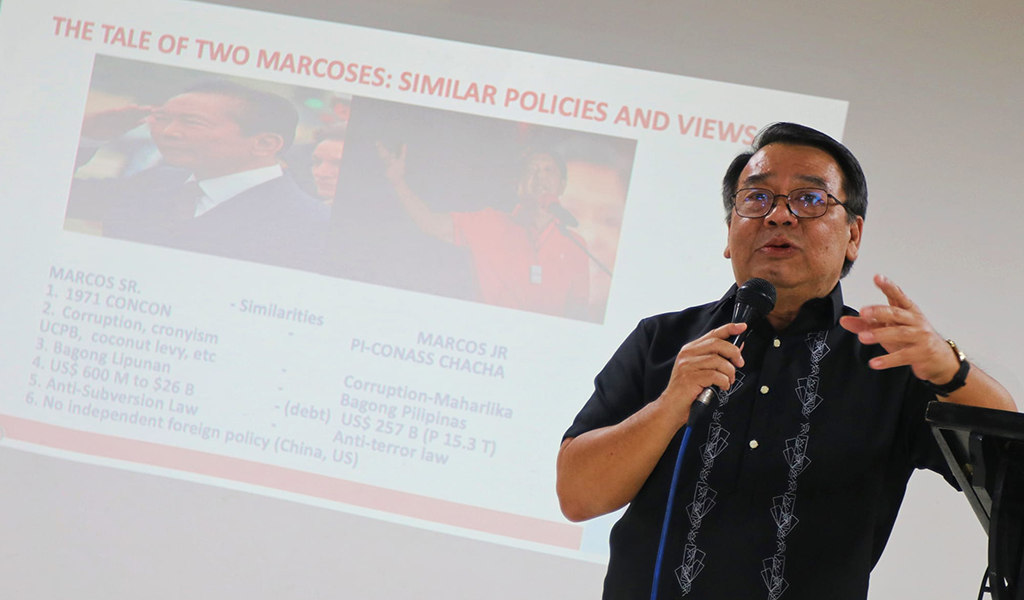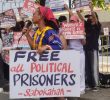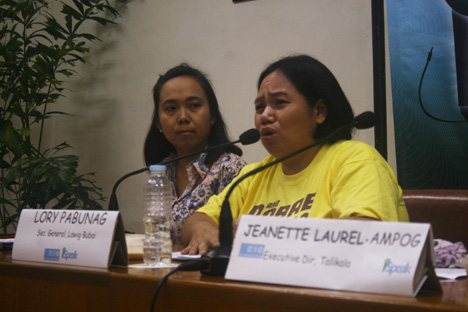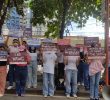
DAVAO CITY, Philippines – It might be coincidence that in time for President Ferdinand ‘Bongbong’ Marcos Jr.’s third State of the Nation Address (SONA), three different forums were held last Saturday, July 20 in Davao City that raised three key questions on the president’s governance.
“Unsay Mapalit Sa Imong 20 Pesos?”
This was the thought-provoking theme of the forum organized by Konsensya Dabaw and the Ateneo de Davao University (ADDU) University Community Engagement and Advocacy (UCEAC) with former Bayan Muna lawmaker Atty. Neri Colmenares as its main speaker.
The question is lifted from a popular ice cream slogan but is a jibe at Marcos Jr.’s election promise that rice prices would go as low as 20 pesos a kilo, which has not materialized, and instead, prices have soared to as high as 56 pesos.
Colmenares said Marcos’ promises of growth are not felt by the people who have suffered from hunger, high prices, low wages, and budget cuts on social services.
The lawmaker notes the irony that the Marcos Jr. administration has borrowed an accumulated P 3.3 trillion since 2022. Yet, the 2024 budget has seen cuts to major government programs, including health and education.
Marcos Jr.’s debt added to P7.75 trillion debt accumulated during Rodrigo Duterte’s administration, has pushed the debt per Filipino now at P136,000.
“At the rate, his debt spree is going, by the end of Pres. Marcos’ term our debt will be Php 22 trillion,” he warned.
Colmenares drew parallels between Marcos Jr. and his late father’s Martial Law era, as both pushed for charter change and leveraged issues of poverty and corruption as the reasons for amendments.
During his term, Marcos Sr. pushed for the ratification of the 1971 Constitutional Convention (ConCon), while Marcos Jr. through his allies in Congress is pushing for people’s initiatives and a Constituent Assembly (Con-Ass).
Colmenares stated that both Marcoses use the same reasons for pushing charter change, that of eliminating poverty and corruption in the government.
“Corruption and poverty are not caused by the Constitution and so amending it will not be the solution,” he pointed out.
The former lawmaker also reminded Dabawenyos of the P500 billion Maharlika Fund and the Php 10 billion Intelligence and Confidential Funds (increased by Php 120 million) which have similarities to how government funds were corrupted during Martial Law.
The forum featured reactors Leo Fuentes Jr. from Masipag Mindanao discussing the state of agriculture, journalist Margarita Valle from the Women Studies and Resource Center tackling women issues, and Ateneo Public Interest Lawyers Association (APILA) director Atty. Romeo Cabarde Jr.
“Unsay bag-o sa Bagong Pilipinas?”
Another former Bayan Muna lawmaker, Davao City-based Attorney Carlos Zarate, spoke in a forum organized by the Union of Peoples’ Lawyers in Mindanao at the Brokenshire Convention Center with leaders from church and sectoral groups as its audience.
Zarate points out that Marcos Jr.’s Bagong Pilipinas (New Philippines) slogan offers nothing new in socio-economic programs, while Filipino workers suffer from low wages amidst inflationary prices.
Zarate stated that in 2022, the Marcos government claimed that the Philippines would have the fastest growth among ASEAN countries, projecting a 6.4 percent growth rate and expecting to become an “economic giant,” 14th in the world, with a “trillion-dollar economy” by 2033.
However, in contrast, the country now has the highest inflation rate at 5.4 percent, the second-highest unemployment rate in ASEAN (Indonesia 5.5%, Philippines 4.5%, Malaysia 3.5%, Vietnam 2.3%), and the third-worst poverty incidence in ASEAN at 18.1 percent.
“The economic situation is worsening and everyone is experiencing this, despite the illusions and promises made by the administration. We support the call to raise living wages, the minimum wage can no longer sustain our needs,” Zarate said.
He stressed that the country’s wealthiest families are becoming richer, with the combined wealth of the top three “oligarchs”—Villar, Razon, and Ang—reaching P1.4 trillion, equivalent to 22% of the country’s economy in the first quarter.
“In the first two years of Marcos Jr.’s term, he has not been able to keep up with the decline in the real value of wages,” Zarate reiterated.
He also highlighted that under the Marcos administration ‘the climate of repression” remains like its successor Duterte and Marcos Sr.’s Martial Law.
“Human rights violations continue to happen, especially against those critical of the government. There is zero justice despite protests by the people, this means impunity still continues,” the former lawmaker said.
Zarate noted data that showed from July 2022 to June 2024, there were 558 victims of extrajudicial killing (104 against dissenters and activists), 828 political prisoners, 316 victims of illegal arrest and detention, and 24,670 victims of bombings and evacuation.
Ano nga ba ang sitwasyon ng kabataan sa kasalukuyan?
Rise for Education–Davao, a group of student leaders, held a forum at Brokenshire Davao Balay Alumni to deliver a State of the Youth Address 2024.
The event which they said gathered student leaders and activists, discussed the research from Rise of Education on the conditions faced by students in the region.
Ali Cabrera, the group’s coordinator, discussed the “learning poverty” of students, which is highlighted by the case of children having the inability to read and understand short texts at the age of 10.
The research affirms the study of the Education Commission (EdCom) and recent international tests that showed low performances from grade school and high school students.
“The report released by the Second Congressional Commission on Education paints a troubling picture of the country’s educational system. It highlights poor ranking compared to other ASEAN countries, learning poverty among children, poor performance by our education agencies, and inaccessible education for poor households, among others,” the Rise for Education Davao stated.
Under the Marcos administration, the youth expressed that the country was “facing an education crisis that has been ignored or inadequately addressed in the past” and emphasized the need for “urgent systematic reforms.”
They also presented the various cases and manifestations of colonialized, commercialized, and repressive education in tertiary-level institutions in the region.
The students said they will continue to expand their organizing to discuss and propose better education programs for the youth. (davaotoday.com)
Bongbong Marcos, charter change, philippines, state of the nation address









